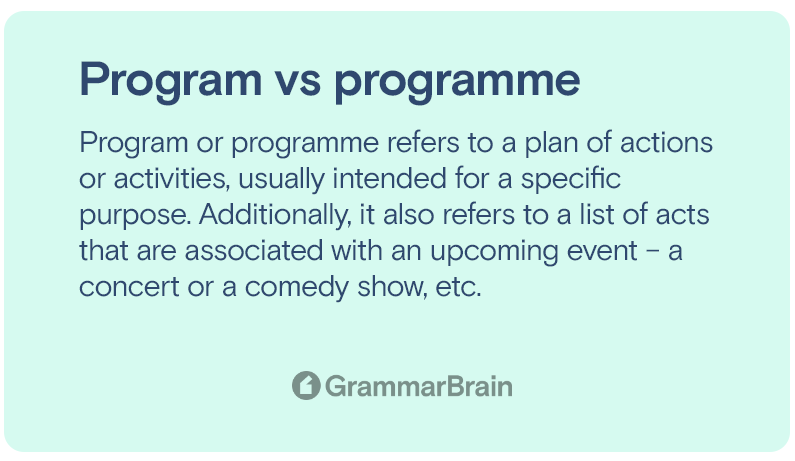Is it programme or program? English is widely spoken across the world but it can be a funny language if not understood with proper meaning and examples. Many similar-sounding words make it difficult for us to use them in phrases or sentences.
Programme and Program are homophonic words that can sound confusing. Not only is their sound identical, but they have different meanings and usage too.
Confused? Don’t be. Read the article below to clarify your train of doubt and understand the meaning and difference between these two terminologies.
| Word | Spelling |
| Program | American English |
| Programme | British English (UK) |
Meaning of program and programme
Program or programme refers to a plan of actions or activities, usually intended for a specific purpose. Additionally, it also refers to a list of acts that are associated with an upcoming event – a concert or a comedy show, etc.
The word program can also be used as a verb. When program is used as a verb, it means to set or regulate a specific result. Further, the word is also used to refer to writing computing code. It was in the 20th century that the word program came to represent the set of coded commands followed by a computer.

Verb or a Noun? Program or programme?
While program can be used both as a verb and a noun, the word programme is only used as a noun. This distinction significantly changes their meaning and usage in sentences. As a verb, program could mean a series of commands in the context of computers and machines.
Understanding the difference between programme ad program
The word program has a number of meanings in English. So, while programme and program are used interchangeably, there is a difference between the two in how they are used. American English uses program as the correct spelling, while in British English, programme is the preferred spelling. However, the word program is used in computing contexts in both American and British English.
To things more clear, Americans use program for almost everything. They do not worry about any specific usage of the term. However, in British English, the word program is specifically used for anything that has to do with computers. Programme, on the other hand, is used for an itinerary or for denoting an event.
Despite knowing the difference between program and programme, these words often confuse people. The next section will help you understand the significant difference and meaning of the two terms with some relevant examples.
Some examples of programme and program
To understand the meaning and difference between the two terms – program and programme, it is imperative to go through some examples. Mentioned below are some examples that will clarify the difference between the two terms.
Examples of programme:
- I am disappointed to know that my name is not included in the dance programme.
- Let us decide the programme for the Diwali festival next month.
- My father watches the dance programme every Sunday.
- Her dance performance is scheduled in the end as per the programme.
Examples of program:
- Learning this program can be useful for working with computers.
- Sangeeta asked the software engineer to program her computer in the evening.
- I will program the alarm for 6 pm tonight.
- This new program is not compatible and does not support my computer.
Now you must have grasped the vital difference between program and programme.
Conclusion
Clearly, program and programme are two words with slightly similar meanings and are often used interchangeably. A trick, however, to remember the main difference could be that programme ends with an ‘E’, and England starts with E. Therefore, always remember that programme is used in British English.
Hope the difference between program and programme becomes easy for you now to use in your everyday vocabulary.
Inside this article
Fact checked:
Content is rigorously reviewed by a team of qualified and experienced fact checkers. Fact checkers review articles for factual accuracy, relevance, and timeliness. Learn more.
Core lessons
Glossary
- Abstract Noun
- Accusative Case
- Anecdote
- Antonym
- Active Sentence
- Adverb
- Adjective
- Allegory
- Alliteration
- Adjective Clause
- Adjective Phrase
- Ampersand
- Anastrophe
- Adverbial Clause
- Appositive Phrase
- Clause
- Compound Adjective
- Complex Sentence
- Compound Words
- Compound Predicate
- Common Noun
- Comparative Adjective
- Comparative and Superlative
- Compound Noun
- Compound Subject
- Compound Sentence
- Copular Verb
- Collective Noun
- Colloquialism
- Conciseness
- Consonance
- Conditional
- Concrete Noun
- Conjunction
- Conjugation
- Conditional Sentence
- Comma Splice
- Correlative Conjunction
- Coordinating Conjunction
- Coordinate Adjective
- Cumulative Adjective
- Dative Case
- Determiner
- Declarative Sentence
- Declarative Statement
- Direct Object Pronoun
- Direct Object
- Diction
- Diphthong
- Dangling Modifier
- Demonstrative Pronoun
- Demonstrative Adjective
- Direct Characterization
- Definite Article
- Doublespeak
- False Dilemma Fallacy
- Future Perfect Progressive
- Future Simple
- Future Perfect Continuous
- Future Perfect
- First Conditional
- Irregular Adjective
- Irregular Verb
- Imperative Sentence
- Indefinite Article
- Intransitive Verb
- Introductory Phrase
- Indefinite Pronoun
- Indirect Characterization
- Interrogative Sentence
- Intensive Pronoun
- Inanimate Object
- Indefinite Tense
- Infinitive Phrase
- Interjection
- Intensifier
- Infinitive
- Indicative Mood
- Participle
- Parallelism
- Prepositional Phrase
- Past Simple Tense
- Past Continuous Tense
- Past Perfect Tense
- Past Progressive Tense
- Present Simple Tense
- Present Perfect Tense
- Personal Pronoun
- Personification
- Persuasive Writing
- Parallel Structure
- Phrasal Verb
- Predicate Adjective
- Predicate Nominative
- Phonetic Language
- Plural Noun
- Punctuation
- Punctuation Marks
- Preposition
- Preposition of Place
- Parts of Speech
- Possessive Adjective
- Possessive Determiner
- Possessive Case
- Possessive Noun
- Proper Adjective
- Proper Noun
- Present Participle
- Prefix
- Predicate



